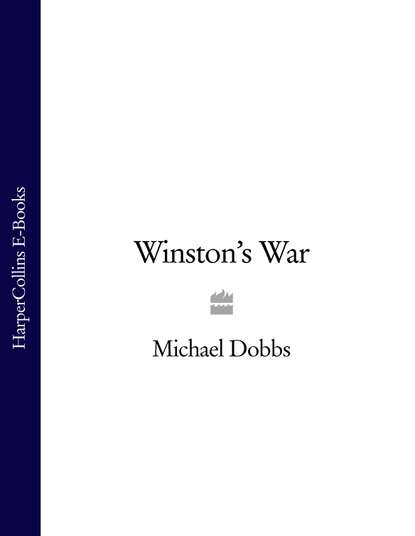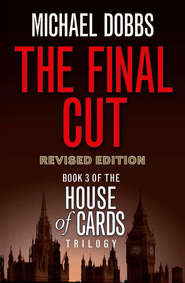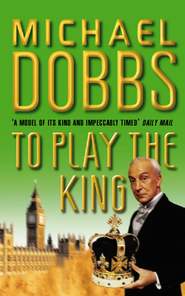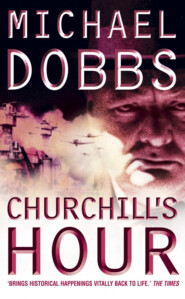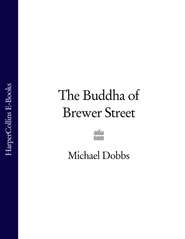По всем вопросам обращайтесь на: info@litportal.ru
(©) 2003-2025.
✖
Winston’s War
Настройки чтения
Размер шрифта
Высота строк
Поля
On the other side of the table Kennedy’s niece whispered in her companion’s ear. ‘What’s ARP?’
The question caused Brendan Bracken to chew his lip, and not for the first time that evening. He was a man of extraordinary features, his vivid red hair cascading down his forehead like lava from an exploding volcano. He had a temperament to match, conducting his outpourings with a wild swinging of his arms. Yet this evening, in the presence of the Ambassador’s niece, he had become unusually subdued. Women – apart from his mother – had never played much of a role in his life, his singular energies having been devoted to making money and climbing the political ladder. And what did women matter in an English Establishment where rumours of homosexuality circulated as freely as the port? Yet Anna Maria Fitzgerald was different. Most other young women he found frivolous and teasing, viewing him either as a potential wealthy match or an object of sexual curiosity, or both, at which point he would hide behind his bottle-end spectacles and invent a new story about himself to suit the situation. But American girls – and Anna in particular – seemed so much more straightforward. He didn’t feel the need to put on an act, but since role-playing had been the habit of his adult life he found it difficult to know what to put in its place. So he grew tongue-tied. Now she was whispering in his ear, smelling fresh, not like a tart, with her fingers brushing the back of his hand.
‘ARP?’ she whispered again.
‘Um, Air-Raid Precautions,’ he explained. ‘You know, ducking bombs.’
‘Horrid!’ Her fingers remained briefly on the back of his hand. ‘I’ve only just arrived in London, to be a sort of assistant to Uncle Joe, and already they’re threatening to destroy it.’
‘I hope you’ll allow me to show you around. I know all the best air-raid shelters.’ It was a clumsy and unintended joke, reflecting his unease, but she laughed it off.
From the end of the table, her uncle finished off his apple pie and slice of American cheese, and decided it was time for the after-dinner entertainment. He had wanted to invite the German Ambassador, Dirksen, but he was engaged elsewhere, so had had to make do with his Spanish Fascist counterpart, the Duke of Alba, instead.
‘Tell me, Duke, some people argue democracy’s finished in Europe. What do you think?’
Instantly Churchill’s head came up. ‘Finished?’ he growled, cutting across the Spaniard.
Kennedy was already in his shirtsleeves; now he slipped off his braces. Time for a scrap. ‘What I mean is, the Brits and the French tried it after the last war, imposing democracy all across Europe, but look around you. It’s been shot to hell – or disappeared completely. Germany, Italy, Spain, Austria – now Czechoslovakia. It never even got started in Russia. And what’s left is so pathetically weak.’
‘Is that the language of the New Diplomacy?’
‘Come on, you’ve been saying yourself you should’ve picked Hitler’s pecker years ago.’
‘Democracy is like a great play. It lasts more than one act. You must be patient, Mr Ambassador.’
‘You mean, like those ARP guys still waiting for their helmets?’
A cheap debating point, or an intended slur? Churchill ignored it.
Kennedy prodded again. ‘But democracy can be a hard mistress, too, you know that, Winston, as well as anyone. And the Germans elected Herr Hitler. You can’t dismiss that fact.’
‘At which point he promptly dispensed with elections.’
‘He’s offered a referendum in the Sudetenland.’
‘Hah! A referendum simply to confirm that which has already been resolved. Thrust upon the poor Czechs. A peculiarly twisted notion of democracy.’
‘But I think you’re forgetting, Winston. British politicians like you and Mr Chamberlain got elected with a few thousand votes. Hitler got elected with millions. Makes Herr Hitler more legit than you, don’t it?’
‘Power is not seized through the ballot box, Mr Ambassador, it is shared. It comes from the people. It is a remarkably infested form of democracy which takes that power in order to enslave its own people.’
‘Aw, come on. You telling me it’s slavery? Slavery don’t get millions of people out on the streets waving banners and torches to give thanks that their country’s no longer starving. German governments used to be chaotic, criminally incompetent. You might have called that democracy, Winston, but to the Germans it was a dung heap. They were dying in the gutter. So Hitler’s replaced the bread lines with armies of workers building autobahns. Where the devil’s the harm in all that?’
‘One day, in a very few years, perhaps in a few months, we shall be confronted with demands that we should become part of a German-dominated Europe. There will be some who will say that would be efficient. Others already say it is … inevitable – a word I do not care for, one that has no place in the dictionaries of a democracy. They argue it will make us all the stronger, that we cannot remain an off-shore satellite of a strong and growing Europe. We shall be invited to surrender a little of our independence and liberty in order that we may enjoy the benefits of this stronger Europe. In a word, we shall be required to submit.’
Churchill was into his stride now. He had pushed his plate away from him, making room on the tablecloth as though preparing to draw out a plan of battle. ‘Soon we shall no longer be ruled from our Parliament but from abroad. Our rights will be restricted. Our economy will be controlled by others. We shall be told what we may produce, and what we may not. Then, a short step thereafter, we shall be told what we may say, and what we may not say. Already there are some who say that we cannot allow the system of government in Berlin to be criticized by ordinary, common English politicians. They claim we are Little Englanders, xenophobic, backward-looking. Already we are censored, sometimes directly by refusing to allow us access to the BBC, at other times indirectly through the influence of the Government’s friends in the press. Every organ of public opinion is being systematically doped or chloroformed into acquiescence and – step by step – we shall be conducted further along our journey until we find, like silent, mournful, abandoned, broken Czechoslovakia, that it is too late! And we can no longer turn back.’
‘Hell, that’s democracy for you. The people want to do a deal with Europe, so that’s what they get,’ Kennedy goaded. ‘You said it yourself, Winston, it’s the people who get to decide. And you saw how they greeted the Prime Minister. The man of the moment. Cheered him all night outside Downing Street.’
‘There was a crowd to cheer him in Munich, too.’
‘Doesn’t that make you think for one moment you may be wrong? There’ll also be a crowd in the House of Commons tomorrow, voting on his policy. You can’t deny he’s gonna win, and win big.’
‘He may win tomorrow. But I shall warn them! And perhaps the day will come when they will remember. Soon we shall discover that we have sustained a total and unmitigated defeat, without firing a single shot in our defence.’ He swept crumbs from the table in front of him like imaginary tank divisions.
‘Winston, you got whipped ’cos you got nothing to fight with. Face up to it, you’re gonna get whipped in any war. That’s why you had to run away.’
Two clenched fists banged down on the table, causing every piece of silver to jump. Churchill’s wine spilled over the rim of his glass. It spread on the cloth like a dark stain crossing the map of Middle Europe. ‘Hitler demanded to feast upon poor Czechoslovakia, and instead of resisting his demands we have been content to serve it to him course by course! At the pistol’s point he demanded one pound. When that was given, the pistol was produced again and he demanded two pounds. Finally, Mr Chamberlain waved his umbrella and consented to offer one pound seventeen shillings and sixpence and to make up the rest in promises of goodwill for the future. My country is shrivelled with shame.’ There were tears in the old man’s eyes. He rose in his seat. ‘I apologize. I am too passionate. But the Ambassador should not have spoken as he did. We have passed an awful milestone in our history, Europe is held at the pistol’s point, and the Western democracies have been found wanting. But this is not the end. This is only the beginning of the reckoning. The first sip, the foretaste of a bitter cup which will be proffered to us year by year unless we, by a supreme recovery of will and vigour, dash it from the dictator’s hand!’
Silence gripped the entire gathering. It was theatre, of course; and Winston always overplayed his role. A candle guttered, dripping wax onto the table cloth where it piled up like a thousand sorrows. Churchill took several moments to recompose himself.
‘There is much to be done. And so little time.’ His eyes searched around the guests, defiant. ‘At Munich the Government had to choose between war and shame. They chose shame. I tell you, they shall get war, too.’ He nodded curtly in the direction of Kennedy, a gesture trembling on the brink of scorn. ‘Come, Mr Bracken. We must set ourselves to our duties.’
Before he knew what he was doing Bracken, too, was on his feet, muttering apologies to Anna and bidding a hurried farewell to the Ambassador, fuming that once again Churchill had taken him for granted. Dammit, he didn’t want to leave, not right now. Churchill always treated those around him as barely better than altar boys, waiting to serve him. They said that about Winston, that he was like Moses, except being more modest he made do with only one commandment: ‘Thou shall have no other god but me.’
‘Pity you have to run off so soon, Winston,’ Kennedy called after the retreating figures, twisting their pain. ‘Say hi to Neville for me. And come again. Come for Thanksgiving. That’s when we normally stuff turkeys.’
‘And don’t forget the air-raid shelters,’ Anna cried out, innocently unaware.
‘Hah! Or your steel helmets. If you can find any …’
Burgess knew it was going to be one of those days when he got drunk, very early, and did something completely appalling. Sometimes he couldn’t help it, he found himself driven, in much the same way that his heart was forced to beat and his lungs to inflate. A friend had once called it a form of madness but it was simply that he viewed the world with different eyes – eyes that were more open and saw more than mere convention and correctness required – which at this moment wasn’t difficult, since convention required the world to be more unseeing and unknowing than ever.
The point had been made most forcefully to him by the Controller of the BBC Radio Talks Department earlier that morning. Burgess had suspected there would be trouble, had even taken the precaution of arriving at Broadcasting House on time and so removing that bone of contention, but punctuality was never going to drain the ocean of irritation that was waiting for him, and neither was argument.
The issue had been Churchill. Burgess had argued quietly, then with growing force, that the inclusion of the elder statesman would add depth and popular appeal to the programme he was preparing on the security problems of the Mediterranean. Admittedly, it wasn’t the most grabbing of topics, but all the more reason to include Churchill. The Controller had simply said no, and returned to his copy of The Times, leaving Burgess standing in front of his desk like an errant schoolboy. He’d bitten his fingernail and stood his ground.
‘Why? Why – no?’
‘Executive decision, old chap,’ the Controller had responded, affecting boredom.
‘But help me. If my suggestion that Churchill be included is an embarrassment, tell me why, so I can understand and make sure I don’t make the same mistake again.’
The Controller had rustled his newspaper in irritation, but offered no response.
‘Is it because he’s an expert in foreign affairs?’
No reply.
‘Or perhaps that he’s one of the best-known historians of our age?’
The rustling grew more impatient.
‘I know. It’s because he has a lousy speaking voice.’
Nothing.
‘Or are you too pig-ignorant or simply too prejudiced to be able to put an explanation into words?’





